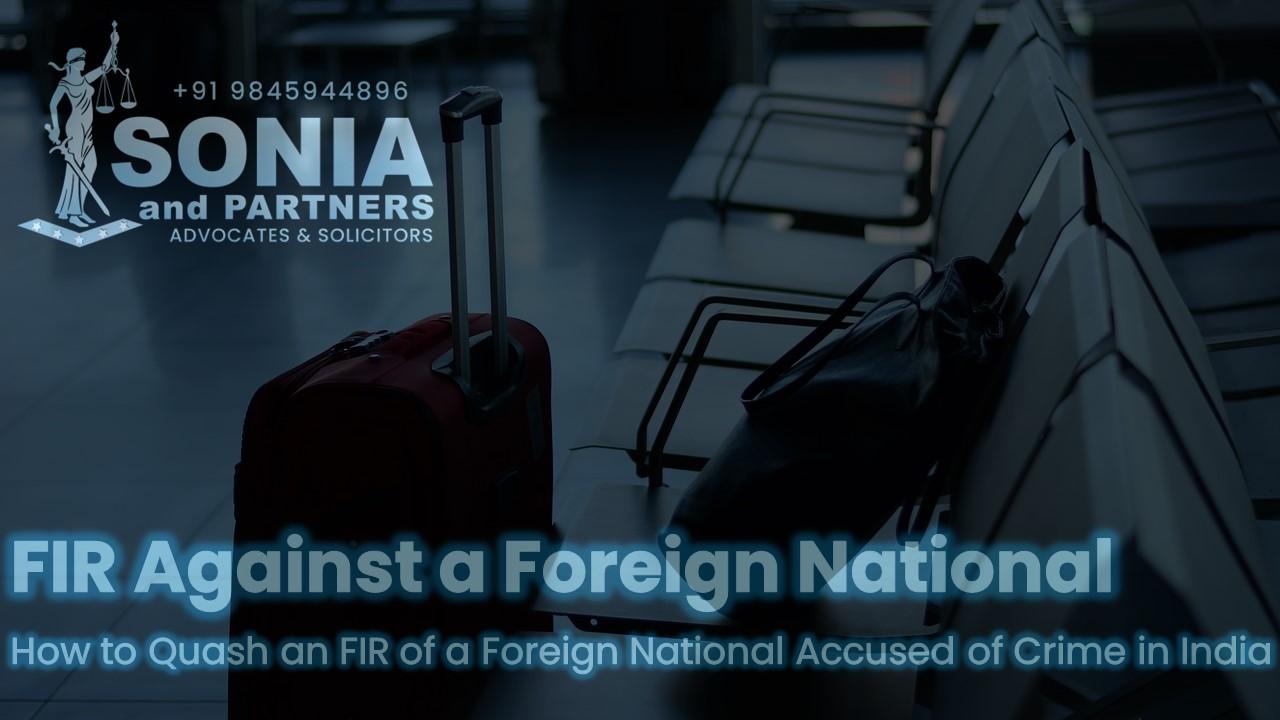Home Blog
Blog How to Quash FIR Registered against a Foreign National Accused of Crime in India
How to Quash FIR Registered against a Foreign National Accused of Crime in India

The quashing of FIR (First Information Report) of a foreign national can be done under certain circumstances. FIR is a written document that is prepared by the police when they receive information about the commission of a cognizable offence.
If a foreign national has been falsely implicated in an FIR or if there is no evidence against them, they can approach the High Court or the Supreme Court of India for quashing the FIR. The court may quash the FIR if it finds that there is no prima facie case against the foreign national.
In addition, if the FIR has been registered in violation of the provisions of the law, the court may quash the FIR. For example, if the FIR has been filed after the expiry of the limitation period prescribed under the law, it may be quashed by the court.
However, it is important to note that the quashing of an FIR is a discretionary power of the court and is not an absolute right of the accused. The court will consider various factors, such as the nature of the offence, the evidence available, the impact on the society, and the interest of justice before deciding whether to quash the FIR or not.
As in the case of Alakh Alok Srivastava vs. Union of India & Ors. the Apex Court dealt with the issue of quashing of FIRs against foreign nationals who were stranded in India during the COVID-19 pandemic. The court held that the foreign nationals who were stuck in India due to the pandemic and were facing criminal charges for violation of visa norms should be given an opportunity to regularize their visa status and leave the country without facing prosecution. The court further held that the concerned authorities should facilitate the departure of such foreign nationals and that the FIRs against them should be quashed if they leave the country within a specified time frame.
In 2021, the Kerala High Court quashed an FIR against a Swiss national named Jonathan Baud, who was arrested for alleged violation of visa norms. The court held that the arrest of the petitioner and the registration of the FIR were not justified as there was no material to show that he had indulged in any criminal activity.
The court observed that the petitioner had been cooperating with the authorities and had even volunteered to leave the country, but the authorities did not accept his request. The court held that the authorities should have considered the petitioner’s request in a more humane manner, especially in light of the fact that the petitioner had been living in India for several years and had made significant investments in the country.
The judgment of the Kerala High Court in this case highlights the need for authorities to consider the representations and grievances of foreign nationals before taking extreme measures such as arrest and registration of FIRs. The court emphasized the need for authorities to be more humane and sensitive towards foreign nationals who have made significant investments and contributions to the country.
In a similar case, the Bombay High quashed a FIR against the Myanmar national and stated “allowing the prosecution to continue would be nothing but an abuse of the process of the Court.” The court found no grounds to continue the investigation for the charges framed.
Procedure to Quash an FIR
Quashing of an FIR (First Information Report) is the process of nullifying or invalidating an FIR by a court of law. It is a legal remedy that is available to an accused person to seek relief from an unjust or malicious FIR filed against them. The procedure for quashing an FIR may vary depending on the country and jurisdiction, but here are some general steps that may be followed:
Drafting a Petition: The first step is to draft a petition to quash the FIR. This petition should include the facts of the case, the grounds for quashing the FIR, and any supporting evidence or legal precedents.
Filing the Petition: The petition should be filed in the appropriate court, along with a copy of the FIR and any other relevant documents. The court may also require the accused person to pay a court fee.
Hearing: After the petition is filed, the court will hear arguments from both sides – the accused person and the prosecuting agency. The accused person will need to provide evidence to support their case for quashing the FIR.
Judgment: After hearing both sides, the court will deliver its judgment. If the court decides to quash the FIR, it will declare it null and void. If the court does not find sufficient grounds for quashing the FIR, it will reject the petition and the case will continue.
Conclusion
In conclusion, a foreign national can approach the High Court or the Supreme Court for quashing the FIR if they believe that they have been falsely implicated or if there is no evidence against them. The court will consider various factors before deciding whether to quash the FIR or not.
It is important to note that quashing an FIR is quite a difficult process and it requires a strong legal argument and evidence to support the case. It is also important to seek the advice of a qualified legal professional and a Best Lawyer for High Court Cases before initiating the quashing process.
Feel free to write to us at mail@lawyersonia.com or call +91 9845944896 if you wish to consult or discuss your matter. “Sonia and Partners” is a Boutique law firm led by Adv. Sonia Rajesh supported by a team of qualified and among the Best Lawyers in Bangalore practicing in the area of Family Law and Criminal defence serving Citizens of India, Overseas Indians, NRIs and Global International Clients.
 11:00 – 19:00
11:00 – 19:00